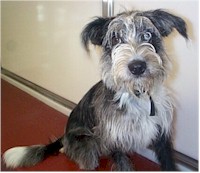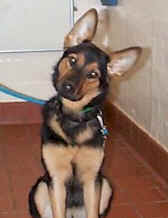| |
'Other breeds' for agility
|
Please note: We have
moved the breed descriptions into their own 'popup' windows to make this
page faster to load. If you can't see a breed's details when you click on
its name or picture below,
please turn off your popup blocker(s) or change your blocker settings to
allow popups from www.agilitynet.com. |
 In
theory, any dog can do agility. Which breed or type you choose depends upon your
personal situation and your preferences. If winning classes regularly is
your goal, you'll probably want a Border Collie or Working Sheepdog. Few
breeds come close to the collie's overall aptitude for competitive agility
(although Kelpie and Aussie handlers may not agree!). But hey, you
don't have to own the fastest dogs to be able to enjoy In
theory, any dog can do agility. Which breed or type you choose depends upon your
personal situation and your preferences. If winning classes regularly is
your goal, you'll probably want a Border Collie or Working Sheepdog. Few
breeds come close to the collie's overall aptitude for competitive agility
(although Kelpie and Aussie handlers may not agree!). But hey, you
don't have to own the fastest dogs to be able to enjoy
 agility. agility.
So much of the sport is dependent upon your relationship with your dog and
meeting your own goals rather
than
beating the other person. Plus changes in the sport now mean that instead
of having to be 'first past the post', we can
accumulate points from "places"
and
clear rounds to progress under both Kennel Club and UK Agility rules. So
owners of ABC dogs (it stands for Anything But Collies, by the way), stand
tall and be proud!
If
you are thinking about getting a
new agility dog - be it a puppy or rescue - consider your goals. If you're
not fixated on having a collie-type, here are some
alternative suggestions for ABC breeds. They
are listed in alphabetical order and described by the people who know them best -
their owners and handlers. If you do not see your breed - teacup, mini, midi, maxi or
giant - or would like to add your comments to a particular entry, just email
Agilitynet.
Now read on...
|
Feedback
From Helen
Tranter (Australia)...
What a great source of info this page was! I am currently competing in Australia and at the
moment we have lots of other breeds who compete. This is great because it definitely takes all
sorts.
(07/08/02)
From Selina Skipper...
I loved the article, and was so impressed with the honesty of
the contributors. (16/07/02)
From Liz Catt...
Great fun to read through!
(01/07/02)
From Jim Webster...
Excellent article. Can we include midis as well please.
(14/06/02)
From Susan Choux...
Wonderful information. Any chance of the same for Minis???
(13/06/02)
From Eric Trafford...
As a mini person, I am disappointed that you have chosen to
feature only standard size breeds. Bring on the Jack Russells and Border Terriers ETC!
(13/06/02)
From Paula Triggs
I thought the article on ABCs was excellent, in particular Liz
Stedman's review on Hungarian Vizslas which describes them perfectly even down to the 'vocal
males'! Needless to say my Ross is one of the noisy ones whose enthusiastic woofing can be
heard all the way round the course!
(11/06/02)
From Angela
I really
enjoyed this article. Please can we now have one on Mini breeds?
I read the bit on the Standard Poodle and the
standard seems much the same as a Mini. I was so pleased to read these disadvantages (There
were the good points that were just as true for my Teddy).
You
cannot keep repeating things over and over again as you might with a Collie. They don't like
the handler getting it wrong and will switch off. I have always argued with my husband that
Poodles get bored easily and not like to keep practising the same thing over and aver again. He
was told by one agility person that the only way to train the weaves was to spend an hour doing
it until the dog it right! I will show him this to prove that what might work with her
Retrievers doesn’t work with a Poodle.
But it was the second
comment that really got me. Some time ago I wrote to the Forum asking why I either get it all
right but once it goes wrong it all goes wrong. This statement 'They don't like the handler
getting it wrong and will switch off.' is exactly what John Leslie said to me on Sunday. I got
half way round a rather tricky open course without a fault. Then I directed him on a back push
through - I don’t know the correct term - with a wave of the harm and the command 'Back.'
Unfortunately Teddy was too quick off the mark and turned on the spot and back jumped. I
shouted at him and tried to call him back. He stared at me looking quite confused and then
started to roam around sniffing the ground. When I did get him to return to me, we completed
the course with out too many hitches. The next time we went he jumped the first jump and then,
as I turned to see if he was with me, he turned and jumped to the left. I couldn’t understand
at the time but everyone watching from my club said that it looked as if I was gong to send him
that way. This time I acted as calmly as I could and just treated the fault as if it Teddy had
got it right. I made the tone of my voice seem as if he had done well and this time he came
straight round the jump back to me and we carried on
tot do the rest of the course with (I think) no more faults (not that it matters as we had been
eliminated in that second jump). I was thinking about this yesterday – when
was kicking myself for being so stupid, and then today
I read this item that made it so plain. Teddy is not being a bad dog; he is just being a
poodle!
(11/06/02)
| |
|